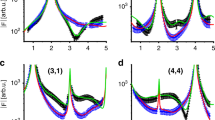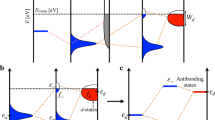Abstract
THE criterion for chemisorption on metals is the occurrence of an electron switch, the resulting complex having a dipole moment orientated vertically to the surface. The method of contact potentials has been employed to evaluate the magnitude of the change in work function of the surface as a result of chemisorption, and recently the vibrating condenser method has been used for the same purpose. There are some disadvantages attached to these methods. In the former, thermal radiation from the emitter may alter the composition of the chemisorbed layer on the cold surface; in the latter, the presence of a large amount of metal and the assumption that only parts of the system are affected by the introduction of the gas militate against the exact determination of the dipole-moment surface-coverage (μ, θ) relationship.
This is a preview of subscription content, access via your institution
Access options
Subscribe to this journal
Receive 51 print issues and online access
$199.00 per year
only $3.90 per issue
Buy this article
- Purchase on Springer Link
- Instant access to full article PDF
Prices may be subject to local taxes which are calculated during checkout
Similar content being viewed by others
Author information
Authors and Affiliations
Rights and permissions
About this article
Cite this article
BAKER, M., RIDEAL, E. Chemisorption on Metals. Nature 174, 1185–1186 (1954). https://doi.org/10.1038/1741185a0
Issue Date:
DOI: https://doi.org/10.1038/1741185a0
This article is cited by
-
Sir Eric Rideal FRS and The Rideal Conferences
Topics in Catalysis (2016)
Comments
By submitting a comment you agree to abide by our Terms and Community Guidelines. If you find something abusive or that does not comply with our terms or guidelines please flag it as inappropriate.



